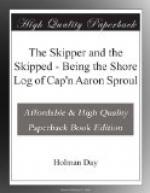“There’s a stone in the graveyard to you,” went on the Cap’n, clawing his stubby fingers into his bristle of hair, “and they’ve always called her ‘Widder Crymble’ and”—he stood up again and leaned forward over the table in the attitude of Jove about to launch a thunderbolt and gasped—“she’s goin’ to get married to Bat Reeves, Tuesday of next week—and he’s the most infernal scalawag in this town, and he’s took her after he’s tried about every other old maid and widder that’s got property.”
The thin man did not even wince or look astonished. His querulous mouth only dropped lower at the corners.
“I don’t care who marries her. She’s a widder and can marry any one she’s got a mind to. I didn’t come back here to mix in. She’s welcome to the property I left her. There was a will. It’s hers. I’ve been administered on according to law. All I want is that school-house back from the town. That’s mine by law.”
Cap’n Sproul sat down once more.
“Well,” he said at last, with some indignation, “if you was dead and wanted to stay dead and leave a widder and property and let her get married again, and all that—what in the name of the yaller-bellied skate-fish have ye come ghostin’ round here for to tip everything upside down and galley-west after it’s been administered on and settled? And it gets town business all mixed up!”
The thin man smiled a wistful smile.
“The poet says: ’Where’er we roam, the sky beneath, the heart sighs for its native heath.’ That’s the sentiment side of it. But there’s a practical side. There’s the school-house. It was worth passing this way to find out whether the town had abandoned it—and I reckoned it had, and I reckoned right. I have presentiments that come true. I reckoned that probably the relict would put a stone in the graveyard for me. I have a presentiment that I shall die twice more, staying dead the fifth time I pass away. That will be here in this town, and the gravestone won’t be wasted.”
While the first selectman was still trying to digest this, the thin man opened his valise. He took out a nickel plate that bore his name.
“This is my casket-plate,” he explained, forcing the grisly object into the resisting hands of the Cap’n. “Friends ordered it for me the first time I died. I’ve carried it with me ever since.”
“It must be a nice way of passin’ a rainy Sunday,” said the Cap’n, sarcastically, pushing the plate back across the table; “set and look at that and hum a pennyr’yal hymn! It’s sartinly a rollickin’ life you’re leadin’, Mister Crymble.”
Mr. Crymble did not retort. On the contrary he asked, mildly, gazing on the scattered sheets of paper containing the selectman’s efforts at town-report composition, “Do you write poetry, sir?”
“Not by a—by a—” gasped the Cap’n, seeking ineffectually for some phrase to express his ineffable disgust.
“I was in hopes you did,” continued Mr. Crymble, “for I would like a little help in finishing my epitaph. I compose slowly. I have worked several years on this epitaph, but I haven’t finished it to suit me. What I have got done reads”:




